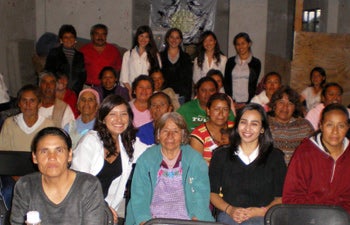Mexico Program Targets Care for Mentally Ill
In a neighborhood in Puebla, Mexico, a dozen promotoras — health care workers who screen ill people to determine what level of doctor care they need — gathered at a private home for a platica — or chat — with USC Dornsife’s Steven Lopez and his students.
In Mexico, sick residents first see promotoras who determine whether they should seek treatment at a clinic or hospital, or if a home remedy would do. But Lopez, professor of psychology and social work, was not there to address the needs of the physically ill, but a woefully neglected population — the mentally ill.
In the United States and Mexico, Lopez said, Latinos are not using mental health services and those with serious mental illness are receiving limited help and sometimes go untreated.
“It’s clear that Latinos are not using mental health services to the extent that other groups do,” Lopez said, citing the stigma against and lack of education about mental illness coupled with economics as reasons. “Our nation does a poor job of making mental health services available to the general public, but especially to people of color including Latinos.”

Steven Lopez’s student researchers stand and sit with residents during a platica in the town of San Juan Bautista in the state of Tlaxcala, which adjoins the state of Puebla. Photo by Steven Lopez.
Lopez is training future researchers who will address this disparity. This summer, he and about a dozen undergraduates and graduates will spend one week at USC and 10 weeks in Mexico investigating mental health care gaps. Funded by the National Institutes of Health’s National Institute on Minority Health and Health Disparities, this summer will mark Lopez’s third research trip to Mexico.
The deadline to apply for the training program is Feb. 1. The program is open to undergraduate and graduate students nationwide who meet the requirements, including having excellent Spanish language oral and written skills.
Trainees will conduct research in the city of Puebla in collaboration with Lopez and Carmen Lara, a professor at the Benemérita Universidad Autónoma de Puebla, or at the Instituto Nacional de Psiquiatría, or at the Universidad Nacional Autónoma de Mexico in Mexico City. They will visit mental health clinics and meet with promotoras and family members of mentally ill people in private homes.
“Conducting research and learning about studies carried out at an international site helps trainees broaden their perspectives on mental health,” Lopez said. “For the undergraduates, the program is meant to motivate them to pursue advanced research degrees.”
Ava Casados, who participated in the training program in Mexico last summer, was motivated. After graduating with a bachelor’s degree in psychology from USC Dornsife and fine arts from the USC Roski School of Fine Arts in Spring 2011, she is working as a research assistant for Lopez and Jo Ann Farver, professor of psychology in USC Dornsife. A Renaissance Scholarship recipient, she plans to earn her Ph.D. in clinical psychology in USC Dornsife.

Ava Casados, who participated in the training program in Mexico last summer when she was a USC Dornsife undergraduate, conducts research at the Biblioteca Palafoxiana in historic Puebla de los Ángeles, the oldest public library in the Americas. Photo courtesy of Ava Casados.
In Mexico, Casados recalled the meetings with promotoras and people who believed a family member may be mentally ill. Some of the promotoras and family members could not read or write. When assessing the possibility of a mental illness, promotoras gave family members questionnaires in the form of pictures and drawings.
Family members arrived with concerns. One wanted to know whether her relative who washes dishes over and over might have a mental issue. Another wondered whether a relative who talks about bizarre experiences may be hallucinating. Lopez was there to improve the attendees “psychosis literacy” to ensure that Latinos with serious mental illness receive appropriate care in a timely fashion.
Each trainee focuses on an issue to research. Casados’ study seeks to understand the role of culture in treatment. The research is meant to improve clinicians’ level of “cultural competence” in treating mentally ill clients. Looking at culture may mean looking at the patient’s ethnicity, or the culture of their profession, or the culture of having been adopted, or having suffered from domestic violence.

Ava Casados who graduated with a bachelor’s degree in psychology from USC Dornsife in Spring 2011, takes some time with her fellow researchers to explore Monte Albán, a large pre-Columbian archaeological site in the Santa Cruz Xoxocotlán Municipality in the southern Mexican state of Oaxaca. Photo courtesy of Ava Casados.
“When treating minorities, psychologists, counselors and social workers in the U.S. often resort to stereotyping,” Casados said. “For instance, they assume family is of utmost importance to Latinos and they may automatically suggest family group sessions. But some Latinos don’t have families. Other times, clinicians might assume certain things about a patient who has a Hispanic surname. But that patient may not even be Latino.”
Another area of research during the training program examines positive family interactions and their link to favorable mental health outcomes for schizophrenics. Lopez’s past studies found that family support protects against relapse for Mexican Americans with schizophrenia.
Still, another research project in the program consists of conducting a public education campaign in Latino communities within California as well as a community in Puebla, Mexico. The intention is to teach participants to recognize a serious mental illness and reduce the help-seeking time.
Trainees will have the opportunity to present their papers at a national conference in either Mexico or the U.S. with project funds if their papers are accepted. Those with successful projects will be encouraged to turn their findings into papers for publication in collaboration with their mentors.
“I loved this training program,” Casados said. “I was excited to learn in a new environment and in a direct way with the actual people who are affected by mental illness. It’s definitely bleak and hard to witness what little resources there are for people who are suffering in Mexico. We hope our research helps the mentally ill in Mexico and the U.S.”
For more information about and to apply to the Latino Mental Health Research Training Progra, visit dornsife.usc.edu/latino-mental-health.